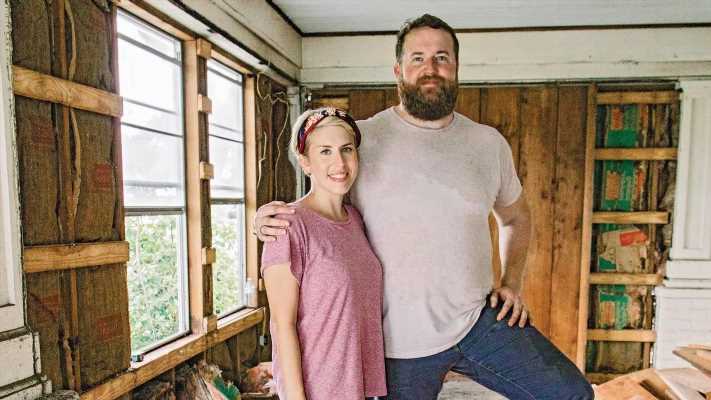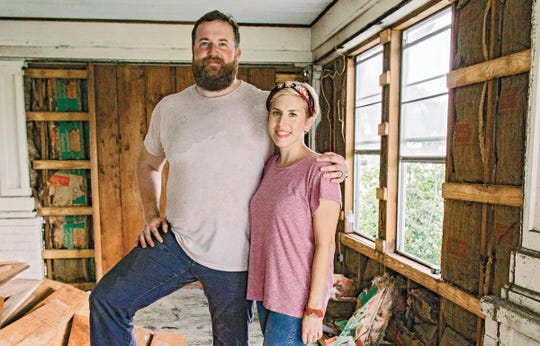HGTV star Erin Napier posted a photo of herself this month bottle-feeding her newborn daughter with a caption that began, “just a little encouragement for you mamas who weren’t able to breastfeed.” What many women heard was, “let go of the guilt.”
Thousands of women thanked Napier for her post, writing “fed is best” and that there should “never be shame” in such intimate choices. One woman wrote she “felt seen.”
Napier joins a number of celebrity moms who in recent years have shared their struggles with mom guilt. Megan Fox last month detailed the pressure she felt to return to work shortly after giving birth, which she said “creates guilt” because women in Hollywood are expected to prioritize losing weight and getting back on set rather than on healing and nourishing their newborns. In 2018 Serena Williams shared on Instagram that she was struggling because “I felt like I was not a good mom.” Pink has said when it comes to parenting, “I put way too much pressure on myself, I think we all do.”
On TikTok, videos with the hashtag #momguilt have more than 30 million views.
More and more women are normalizing feelings of mom guilt and encouraging others to relinquish its hold on their lives. While individual women may be able to temper their feelings of guilt, experts say this deeply rooted cultural phenomenon cannot be collectively addressed without major changes in how society thinks about who should take care of children.
"Don’t let anyone make you feel less than," Erin Napier said to bottle-feeding moms. (Photo: Laura Good)
Sociologists who study motherhood say maternal guilt is the product of a cultural belief that women are the “natural” and “best” caregivers, which makes them primarily responsible for their children’s well-being. Mothers are the ones tasked with navigating the overwhelming and often conflicting advice around everything from feeding to sleep to development.
“That means that if something goes wrong – if a child gets sick or hurt or struggles in school or in life more generally – mothers are going to get the blame,” said Jessica Calarco, a professor of sociology at Indiana University whose research program focuses on systems of inequality. “That blame, or the possibility of blame, is the source of maternal guilt. Essentially, mothers feel guilty when something goes wrong with their children – or when something might go wrong with their children – because our society tells them that they should be able to protect their children from every possible harm.”
View this post on Instagram
A post shared by Erin Napier (@erinapier)
Children can grow up to be healthy and happy whether they drink from the bottle or breast, whether they go to daycare or stay home for the first few years of life. But the fervor around these debates suggests dire consequences should a mother choose wrong, creating cycles of fear and guilt that not only harm mothers’ mental health (which is by far one of the most crucial indicators of a child’s well-being) but also distracts from the larger structural issues that make motherhood impossible for all women.
Analysis: Why American moms are seriously struggling
Shopping for mom? Here’s what your mom actually needs
“Maternal guilt is the linchpin of gender inequality here in the U.S,” said Caitlyn Collins, a sociology professor at Washington University. “It’s stalling the gender revolution.”
How maternal guilt hurts mothers
Experts argue, and many mothers agree, that expectations around motherhood are categorically impossible for anyone to meet. And yet women endlessly try, because they are given the message that motherhood is central to what it means to be a good woman, and, as Collins said, to “do your gender correctly.”
“They make women work ever harder to try and achieve what is an impossible goal,” Collins said.
Maternal guilt isn’t some biological byproduct of mothers’ investment in their children. Maternal guilt, Calarco said, is a tool used by society to keep mothers in their place. When mothers are driven by guilt, they prioritize their children and families above their own needs and careers, giving men the opportunity to stay ahead.
“That might mean stepping into part-time work after childbirth, not applying for positions that would require long work hours or large amounts of travel, or leaving the workforce to care for their children at home. It’s easy to say – ‘well, women made those choices, so that’s OK.’ But once women make those choices, it becomes easier for companies and different-sex couples to justify further deprioritizing women’s careers,” Calarco said.
Mom guilt can also have collective health costs. In one of Calarco’s studies, her and co-author Elizabeth Anderson found guilt played a role in leading some mothers to oppose COVID-19 vaccines for their children.
“Misinformation campaigns on social media have targeted mothers, telling them that the COVID-19 vaccine will cause serious harm,” she said.
The ‘Mommy Wars’
Another way maternal guilt manifests is by pitting women against one another. It can look like the breast-feeding/bottle debate or employed mothers and stay-at-home mothers each claiming the moral highground.
“Women can protect themselves from guilt, in part, by vilifying other women who make choices different from their own,” Calarco said.
The problem with the “mommy wars,” Collins said, is that it distracts from the reality of why any woman feels they need to judge other moms for their decisions.
“Having women fight amongst one another, or think that they are being judged by one another constantly prevents us from looking more broadly to think, ‘wait a second, why is it that all of us feel so stressed and guilty and overwhelmed constantly?,'” Collins said. “There’s something bigger and more important going and our ire should not be directed toward one another but in fact, toward a system that makes it difficult for all of us to have the fulfilling family lives that we want and also deserve.”
Many women think the problem is their next door neighbor, the mom up late icing a cake for the school bake sale. But Collins says the culprit is a deeply individualistic society that still does not distribute the costs and responsibility of child-rearing evenly.
Letting go of mom guilt
Collins’ research shows that because of an intensive version of mothering women are expected to live up to, maternal guilt is a pervasive phenomenon across many wealthy Western nations. But she argues that what other countries have that the U.S. lacks are a series of public policies that can help women mitigate that guilt.
The U.S. is the only country in the Organisation for Economic Cooperation and Development (OECD) that does not offer paid leave on a national basis and it is one of the five least affordable nations for child care.
“Without an infrastructure in place to help enable parents to live out the fulfilled lives they want at home, in reconciling that with their paid work commitments, acute guilt is a very real consequence,” Collins said.
Experts say for mothers to let go of guilt, they have to stop seeing it as inevitable.
“The pandemic really created some fractures in our collective cultural imagination about who can and should care for kids,” Collins said. “That to me is a very exciting generative possibility for social and political change. This idea like, ‘Wait a second. Maybe it’s not my own fault that life is so hard.’ And I think that is helping women say, ‘Wait a second. It’s not that my neighbor next door is just more organized and on top of things than me, and I’m jealous of her. Maybe it’s too hard for all of us.'”
Source: Read Full Article

